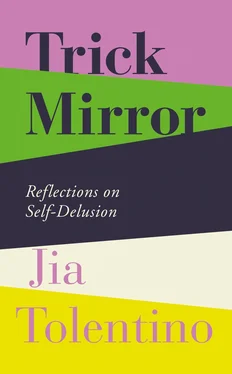It took me months to work up the courage to actually watch Girls v. Boys, which was an unusual feeling: the show itself is proof that I don’t hesitate to do much. But I found that I physically could not bring myself to restart the show. In the winter of 2018, after drinks on a snowy weeknight at a bar in Brooklyn, I dragged my friend Puja home with me to watch the first half of the season. A few days later, I made my friend Kate come over to watch the rest.
It was strange to see so much video footage of myself as a teenager. It was stranger to see how natural we all acted—as if giving confessionals and being chased around by cameramen was the most normal possible thing. And it was strangest, maybe, to see how little I had changed. When I started phoning up the rest of the cast, that time-warp sense intensified. Everyone was around thirty, an age where most people feel some distance between their adolescence and the present. But we had all been, as Jess mentioned, abnormally confident as teenagers—our respective senses of self had been so concrete. I asked everyone if they felt they’d changed a lot since the TV show. Everyone told me they had grown up, obviously, but otherwise felt pretty much the same.
Kelley, now married, lived in Newport Beach and worked in business development for a real estate company. Krystal lived in Los Angeles and was acting and modeling while working a day job and raising her twenty-month-old daughter, with whom she had appeared on another reality show, TLC’s Rattled . Cory, the sweet country boy who’d gotten his first kiss on camera with Kelley, lived in Orlando with his boyfriend and worked for Disney. Demian, the goofball who had grown up in Vegas, still lived there, working as a club promoter. Ace was in DC. Ryder didn’t answer my messages, and I held off on reaching out to Paris after checking her Facebook, where she was documenting, gracefully, a month in outpatient therapy for bipolar II.
I asked everyone what roles they thought we’d all played in the show. Half of the casting was obvious to everyone. Cory, Kelley, Paris, and Krystal had all played fixed archetypes: the sweet guy, the all-American girl, the wacko, the bitch. The rest of us—Demian, Ryder, Ace, and me—weren’t as clear. Demian thought he’d been cast as the asshole; Kelley guessed that Demian was the prankster; Krystal guessed the “stoner lothario, sort of Jersey Shore .” Ryder was all over the map for everyone—the pretentious artistic boy, the slutty jock, the flamboyant punk rocker—and I was, too. Though I’m sure they would’ve answered differently if someone else had been asking, my castmates guessed I was the smart one, or the sweet one, or the “fun Southern one,” or the prude.
To even ask these questions is to validate a sort of classic adolescent fantasy. Reality TV enacts the various self-delusions of the emotionally immature: the dream that you are being closely watched, assessed, and categorized; the dream that your life itself is movie material, and that you deserve your own carefully soundtracked montage when you’re walking down the street. On the show, this was the actual world that the adults constructed around us. We were categorized as characters. Our social dramas were set to generic acoustic ballads and pop punk. Our identities were given a clear narrative importance. All of this is a narcissist’s fantasy come true. “There’s a saying we have in reality,” Jess, the producer, told me, while we were sitting in Midtown. “Everyone signs. Most people want to be famous. Everyone thinks they could be a better Kardashian than the Kardashians. You see it now, with these apps, everyone likes to have an audience. Everyone thinks they deserve one.”
In high school, I craved the sort of rapt attention that the Girls v. Boys cameras would provide me. In my journal, I constantly overestimate the impressions that I’m making on other people. I monitor myself, wondering how my friends and classmates see me, and then trying to control whatever they see. This is, I write, an attempt to be more honest: I want to act in a way that reflects how I feel; I want to live the way that I “really am.” But I also worry that I’m more interested in narrative consistency than anything. I worry that all this self-monitoring has made me, as I wrote in 2004, too conscious of what “Jia” would do in this situation—that I’m in danger of becoming a “character to myself.”
This anxiety is something that would stick with me, clearly. But Girls v. Boys dissolved part of it in a peculiar way. On the show, where I was under constant surveillance, I was unable to get far enough away from myself to think about the impression I was leaving. When everything was framed as a performance, it seemed impossible to consciously perform. In 2005, when I got back to Texas, all the conjecturing disappeared from my journal. I stopped wondering how anyone at my high school saw me; I had no thoughts about how I’d appear on the show. Knowing that I was seen got rid of my desire to see myself, to analyze myself as a character. When I watched the first episode, I thought: How boring, how embarrassing, it’s me.
Within a few years, I would begin to think that the impression I left on people was, like the weather, essentially beyond my ability to control. In retrospect, I just started to control it subconsciously rather than consciously. The process of calibrating my external self became so instinctive, so automatic, that I stopped being able to perceive it. Reality TV simultaneously freed me from and tethered me to self-consciousness by making self-consciousness inextricable from everything else.
This was useful, if dubious, preparation for a life wrapped up with the internet. I felt the same thing watching the show that I do when I’m on the train in New York, scrolling through Twitter, thinking, on the one hand: Where are we underneath all of this arbitrary self-importance? And on the other: Aren’t we all exactly as we seem?
A bright morning, sleepy teens. At the breakfast table, JIAawkwardly tries to tell PARISshe’s sorry about what’s coming. On the beach, PARISand RYDERget voted off. “I don’t take it personally, but that doesn’t mean it doesn’t suck like a bitch,” PARISsays.
The six remaining contestants spin on a wheel and throw balls at one another; the girls lose. ACEand JIAenter an abandoned military barracks with night-vision cameras and padlocks. Girls lose again. The next morning, the hosts are downstairs—another twist.
Every episode of Girls v. Boys is structured the same way. We do a challenge, then we go home to talk about who we hate and who we have a crush on, then we repeat. The predictability of reality TV accrues into hypnosis. The sun rises in streaky golden time-lapse; the camera pokes into the white mosquito nets over our bunk beds, and we yawn and say today we’re going to win. We line up on the beach wearing board shorts and bikinis; a bell goes off; we run around on the sand assembling giant puzzle pieces; the hosts rack up points on the board. The sun sets in time-lapse again, fluorescent pink into deep twilight, and at night, with our tans darkening and hair curling more with every episode, we complain about one another and start fights and occasionally kiss.
I was amazed, watching the show, to see how much I had forgotten. There were entire challenges I had no memory of. We had sold homemade souvenirs at the Wyndham (?), raced each other in kayaks with holes in the bottom (?), gotten on our knees with our hands tied behind our backs and eaten wet dog food out of bowls (?). In one episode I pick up a guitar and improvise a long ballad about the ongoing romantic drama at the house. It worried me that I could remember almost nothing that occurred off-camera. I had no idea, for example, what we ate every day.
Читать дальше












